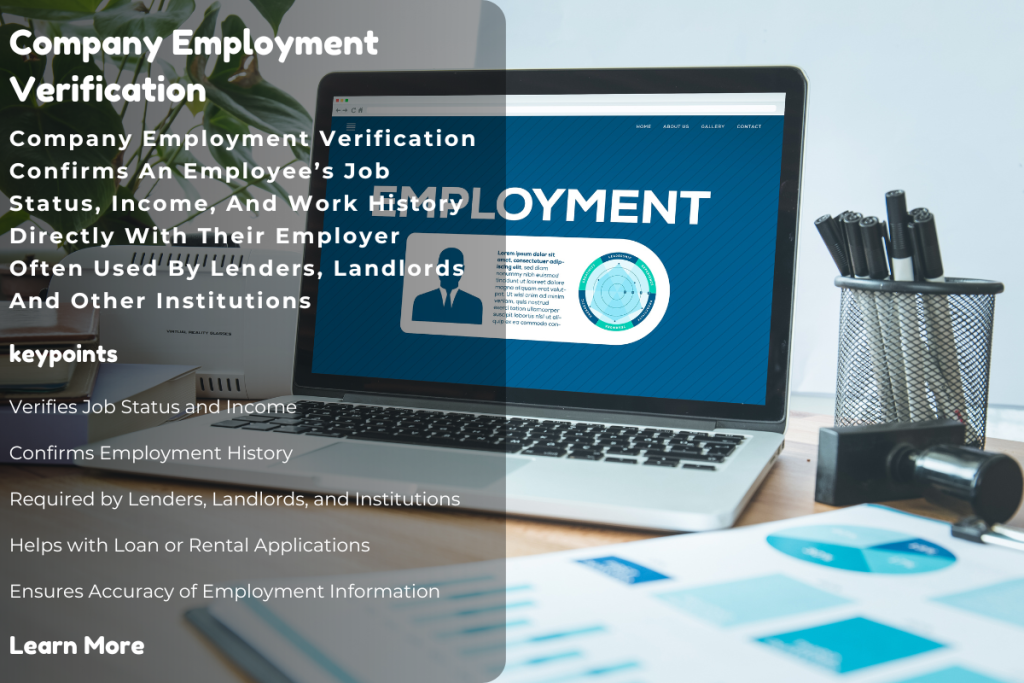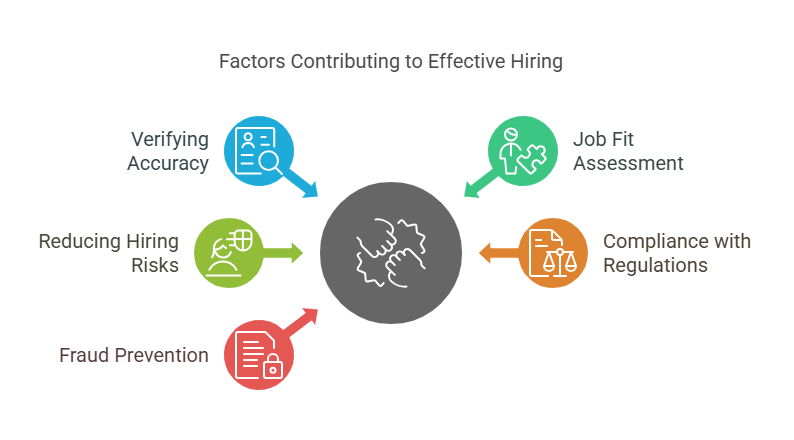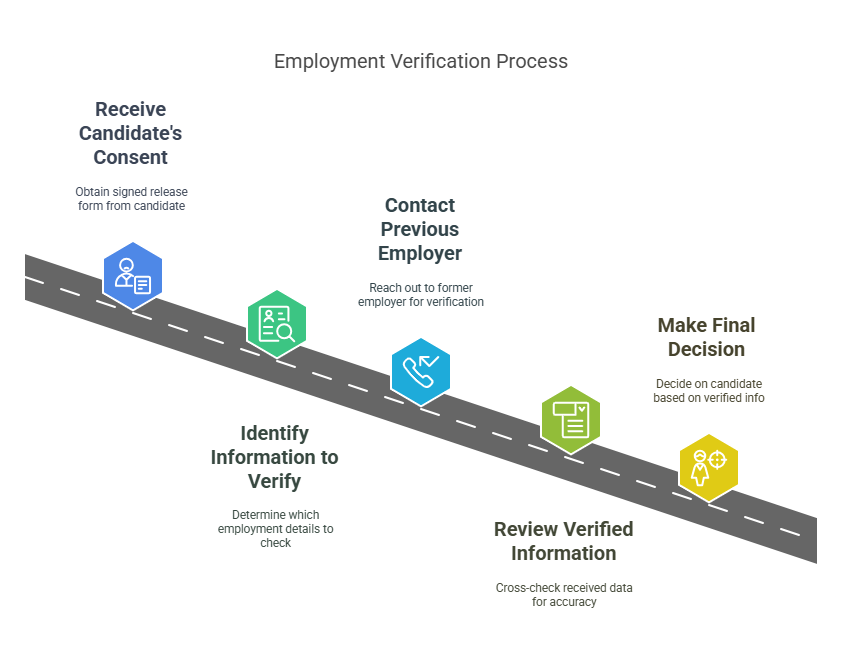A Complete Guide to Company Employment Verification

What is Company Employment Verification and Why Is It Important?
Company employment verification is the process by which an employer confirms the employment details of an individual. It typically involves verifying a candidate’s job title, dates of employment, salary, and other relevant details with their current or former employer. This process is an essential step for employers to ensure they are making informed hiring decisions, particularly when considering a candidate for a position that requires specific qualifications or experience.
The Importance of Company Employment Verification

Company employment verification plays a crucial role in multiple stages of the hiring process. Here’s why it is so important:
- Verifying Accuracy of Candidate Information
Candidates often provide detailed information about their job history, skills, and accomplishments during the recruitment process. Employment verification helps employers confirm the accuracy of these claims. By reaching out directly to the candidate’s previous employers, companies can ensure that the information provided is true and reliable. - Ensuring Candidate’s Job Fit
An employment verification helps assess whether a candidate has the right qualifications, experience, and work history for the position in question. It’s crucial for determining if the candidate can perform the job effectively based on past roles and performance. - Reducing Hiring Risks
Verifying employment helps identify potential red flags that could impact a candidate’s job performance or reliability. If there are discrepancies or questionable aspects of a candidate’s work history, this process can highlight those before the candidate is hired, reducing the risk of a bad hire. - Compliance with Legal or Regulatory Requirements
In some industries, legal or regulatory requirements mandate that certain job qualifications be verified. For instance, healthcare, finance, and education sectors may require thorough verification to ensure that candidates hold the necessary certifications or have relevant experience. - Preventing Fraud
Employment verification also plays a key role in preventing fraud. Candidates may exaggerate or falsify employment history to appear more qualified. This process provides a safety net for employers to catch such discrepancies early on, avoiding potentially costly consequences.
Common Uses of Company Employment Verification
While the primary purpose of employment verification is to support hiring decisions, it also plays a key role in other scenarios, such as:
- Background Checks: Employers conducting comprehensive background checks rely on employment verification to validate claims made by the candidate during interviews and on their resume.
- Loan or Mortgage Applications: Lenders, such as banks or financial institutions, often request verification of employment to confirm a borrower’s income and job stability. This helps assess the borrower’s ability to repay loans or mortgages.
- Rental Applications: Landlords may also require verification of employment to ensure that potential tenants have a steady income and can afford rent payments.
By providing a reliable and accurate record of a candidate’s employment, this process helps ensure that decisions are based on solid information. This verification can be conducted directly through an employer or through third-party services, ensuring a quick and efficient method of obtaining employment history.
How Does Company Employment Verification Work and How Can It Benefit Employers?
Company employment verification is a process that involves confirming the details of a candidate’s past employment. This may include the candidate’s job title, salary, dates of employment, and other relevant information. By verifying these details, employers can ensure they are making well-informed hiring decisions, reducing risks, and verifying the accuracy of the candidate’s work history.
The Steps Involved in Company Employment Verification

The employment verification process typically follows these key steps:
- Receiving the Candidate’s Consent
Before starting the verification process, employers should seek the candidate’s consent. This is usually done through a signed release form that authorizes the employer to reach out to the candidate’s previous employers. This ensures compliance with privacy laws and regulations. - Identifying the Relevant Information to Verify
Employers must identify what information needs to be verified. Common details to verify include:- Job title
- Dates of employment
- Salary (if applicable)
- Job responsibilities
- Reason for leaving
- Contacting the Previous Employer
The next step is reaching out to the candidate’s former employer to verify the information. This can be done through various methods:- Direct Contact: Employers may contact a former HR representative, manager, or department head.
- Automated Verification Systems: Many companies use third-party services that allow employers to verify details online through automated systems.
- Reviewing the Verified Information
After receiving the verification details from the previous employer, the information must be cross-checked to ensure its accuracy. Discrepancies or discrepancies in the information could require further investigation or clarification from the candidate. - Final Decision
After completing the verification, the employer will decide whether the candidate is the right fit for the role, based on the verified information. This decision should be made thoughtfully, as inaccurate or inconsistent employment records can indicate potential issues.
How PreciseHire Can Help Streamline the Process
At PreciseHire, we understand that conducting employment verification can be a time-consuming and complex task for employers. That’s why we offer comprehensive employment verification services that streamline this process, ensuring you have access to the most accurate and reliable information in a timely manner.
Our services include:
- Automated Verification: We simplify the verification process with digital tools that allow for quick and efficient employment history checks.
- Comprehensive Background Checks: We provide complete background checks that include detailed employment verification, helping employers make well-informed decisions.
- Support for Legal Compliance: PreciseHire ensures that all employment verification is conducted in compliance with federal and state regulations, mitigating legal risks for your organization.
For example, if a company is considering hiring a candidate for a finance role, they would typically request an employment verification to confirm that the candidate has the necessary experience in the finance industry. Through PreciseHire, employers can quickly access the candidate’s employment history, verifying positions, job titles, and skills to ensure they align with the qualifications required for the role.
Benefits for Employers
- Increased Efficiency: By using a third-party service like PreciseHire, employers save time and resources compared to manually contacting each reference or previous employer.
- Accurate and Reliable Information: Employers can rely on accurate, up-to-date, and verified employment history.
- Reduced Risk of Hiring Errors: Employment verification ensures that the candidate’s history matches what was claimed, reducing the risk of hiring unqualified candidates or those with misleading information.
